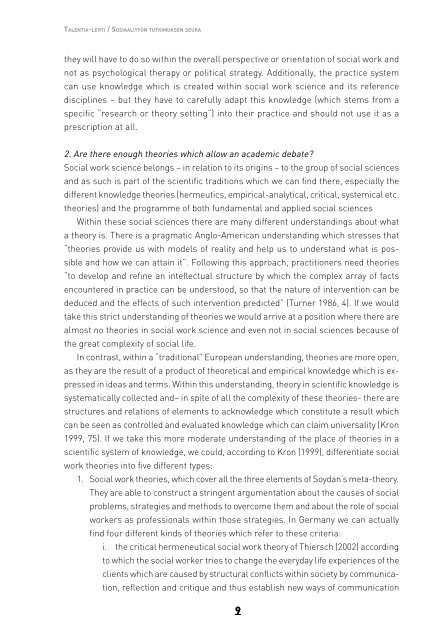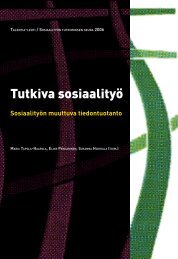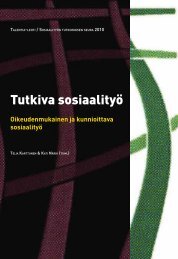Tutkiva sosiaalityö - Sosiaalityön tutkimuksen seura
Tutkiva sosiaalityö - Sosiaalityön tutkimuksen seura
Tutkiva sosiaalityö - Sosiaalityön tutkimuksen seura
You also want an ePaper? Increase the reach of your titles
YUMPU automatically turns print PDFs into web optimized ePapers that Google loves.
Ta l e n t i a-l e h t i / So s i a a l i t y ö n t u t k i m u k s e n s e u r a<br />
they will have to do so within the overall perspective or orientation of social work and<br />
not as psychological therapy or political strategy. Additionally, the practice system<br />
can use knowledge which is created within social work science and its reference<br />
disciplines – but they have to carefully adapt this knowledge (which stems from a<br />
specific “research or theory setting”) into their practice and should not use it as a<br />
prescription at all.<br />
2. Are there enough theories which allow an academic debate?<br />
Social work science belongs – in relation to its origins – to the group of social sciences<br />
and as such is part of the scientific traditions which we can find there, especially the<br />
different knowledge theories (hermeutics, empirical-analytical, critical, systemical etc.<br />
theories) and the programme of both fundamental and applied social sciences<br />
Within these social sciences there are many different understandings about what<br />
a theory is. There is a pragmatic Anglo-American understanding which stresses that<br />
“theories provide us with models of reality and help us to understand what is possible<br />
and how we can attain it”. Following this approach, practitioners need theories<br />
“to develop and refine an intellectual structure by which the complex array of facts<br />
encountered in practice can be understood, so that the nature of intervention can be<br />
deduced and the effects of such intervention predicted” (Turner 1986, 4). If we would<br />
take this strict understanding of theories we would arrive at a position where there are<br />
almost no theories in social work science and even not in social sciences because of<br />
the great complexity of social life.<br />
In contrast, within a “traditional” European understanding, theories are more open,<br />
as they are the result of a product of theoretical and empirical knowledge which is expressed<br />
in ideas and terms. Within this understanding, theory in scientific knowledge is<br />
systematically collected and– in spite of all the complexity of these theories- there are<br />
structures and relations of elements to acknowledge which constitute a result which<br />
can be seen as controlled and evaluated knowledge which can claim universality (Kron<br />
1999, 75). If we take this more moderate understanding of the place of theories in a<br />
scientific system of knowledge, we could, according to Kron (1999), differentiate social<br />
work theories into five different types:<br />
1. Social work theories, which cover all the three elements of Soydan’s meta-theory.<br />
They are able to construct a stringent argumentation about the causes of social<br />
problems, strategies and methods to overcome them and about the role of social<br />
workers as professionals within those strategies. In Germany we can actually<br />
find four different kinds of theories which refer to these criteria:<br />
i. the critical hermeneutical social work theory of Thiersch (2002) according<br />
to which the social worker tries to change the everyday life experiences of the<br />
clients which are caused by structural conflicts within society by communication,<br />
reflection and critique and thus establish new ways of communication<br />
9









